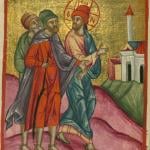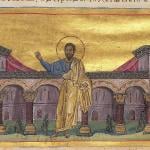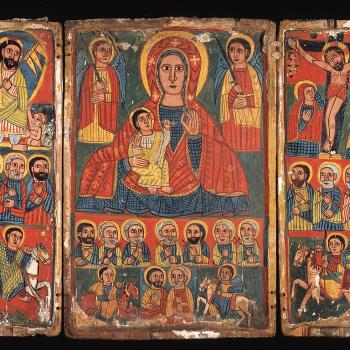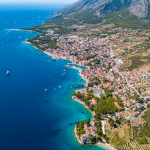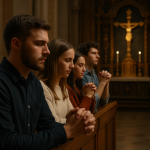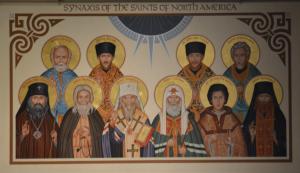
When I became Byzantine Catholic, I became more than Catholic, but also a member of the greater Eastern Christian tradition, and not just any Eastern Christian tradition, but the Byzantine tradition, and not just any Byzantine tradition, but the Byzantine Catholic tradition. The Byzantine tradition manifests itself in a variety of cultural situations, adapting itself to meet each situation, which is one of the legacies of the work of Sts. Cyril and Methodius. For me, that cultural background, as with other Byzantine Catholics in the United States, is that of the Ruthenians, which is Slavic in identity. Thus, as I became a Byzantine Catholic, I became interested in the varieties of the Byzantine experience, but especially, the Slavic varieties, and with it, the various theological and spiritual writers found in the Byzantine tradition.
As a Catholic, I have studied the great theologians and saints of the Catholic faith, including and especially those from the Western (Roman) tradition. They certainly have and continue to influence and inspire me. But I study them and engage them through the sensibility I have gained from becoming an Eastern Catholic. That is, I engage them through a particular hermeneutical lens, one specifically formed by Eastern spirituality and its modes of thinking. I embrace the wisdom of the East, a wisdom which is found not only in the Greek (and Syriac, and other Eastern) Fathers and Mothers of the Church, but also in the spiritual tradition which has lived out that wisdom, a tradition which has produced a great number of saints, some who lived and thrived before the Great Schism, but many who lived and thrived after it. Despite the schism, there are many great saints who lived out the Eastern spiritual charism, saints who wrote on it and explained it, saints who showed care and concern and holiness like the saints who came before the schism. Thus, even those who have come since the division which emerged between Rome and Constantinople. most, if not all of the saints from the Orthodox tradition, are recognized for their sanctity, allowing us to venerate them as saints. Some, like St. Gregory Palamas, have their feast day recognized on various official Eastern Catholic calendars, with others recognized for their holiness and sanctity without any official veneration offered to them.
It sometimes surprises Western Catholics the way Byzantine (and other Eastern) Catholics look to Orthodox saints and venerate them along with the Orthodox. It is because Eastern Catholics not only recognize their holiness, but they see how those saints serve and represent the spiritual charism that they follow. They cannot but recognize the holiness of someone like St. Seraphim of Sarov or St. Herman of Alaska. Some Western Catholics have argued against this, but the East, in general, has been told it can hold to and venerate these saints, and we have seen affirmations of this coming from various Popes. After all, did not St. John Paul II call St. Serpahim of Sarov a saint in his own writings, and did not Pope Francis declare St. Gregory of Narek, an Armenian, not only a saint, but a Doctor of the Church?
Saints are saints due to grace. Ecclesiastical politics, and with it, the various relationships and degrees of communion between the apostolic churches which emerge as a result of such politics, can cause confusion in regards who is and is not a saint. Following those who I have read and studied, like Vladimir Solovyov, I have come to see the relationship between the churches after the schism is more complex than many realize; this is because there has always been an imperfect form of communion between them, a communion which shows that, despite the divisions which have formed between the apostolic churches, there remains an underlying connection which holds them together in the mystical body of Christ. Thanks to that connection, it is easier to understand that the Holy Spirit continues to be at work with the Orthodox, producing saints which Catholics can recognize. There might be some issues in regards saints who seem to be declared a saint in honor of the political divides between the churches, but even then, history shows us that they can still be saints. I learned this lesson as I studied the life and writings of St. Cyril of Alexandria. Because his beloved uncle, Theophilus of Alexandria, was involved in the condemnation and exile of St. John Chrysystom, Cyril initially did not want to recognize John’s place in the church, let alone John’s sanctity. Eventually, Cyril relented; his arguments against the recognition of John were similar to those who now argue against post-schism Orthodox saints: he thought John died, not only deposed and in exile, but outside of communion from the church, but eventually, he was able to relent and recognize John’s holiness. Infighting in the church, and with it, various levels of internal conflict, can and does cause problems, and even holy saints can and will be wounded by it, but that wound does not counter the work of the Spirit. Grace is able to work its wonders, helping imperfect men and women become saints, and they can still have much to say and show us about how to live as Christians (and, if and when they did some wrong, their mistakes can serve as a lesson of what we should not do).
Thus, I learned, especially through Solovyov, to accept that there remained an underlying, mystical unity between the apostolic churches; they all have proper holy orders (apostolic succession), and with it, the eucharist. With the eucharist, they share the same Christ. Everyone who receives Christ in communion are united in Christ, even if in external appearances, and in the imperfections which emerge from those appearances, they remain in conflict with each other. Byzantine Catholics, like other Eastern Catholics, are meant to help make that internal mystical unity realized externally; they are called to serve as mediators between the various apostolic churches, taking on what they can from the Western tradition but doing so in an authentically Eastern way. This is a challenge, and there are many ways that challenge has been realized, some better than others. What is key, what is necessary for Eastern Catholics to fulfill their mission, is for them to continue to engage the tradition, the heritage, and the spiritual wisdom they have with their Orthodox brethren. This is why so many of us find ourselves reading and engaging many post-schism saints (and theologians), finding they speak to us in a way many in the West do not do, as those saints and theologians speak to a rich heritage which the West does not have and does not understand, a heritage which we continue live out even as Catholics.
Now, to be sure, as a Byzantine Catholic, while I find myself learning from the Orthodox, from both their saints and theologians, I still find it important to remain in communion with Rome and defend the West from unjust accusations coming from some of the Orthodox. I find communion with Rome helps overcome some of the problems found in the Orthodox world, among which, the Orthodox have a tendency to divide themselves up into nationalistic entities, entities which end up fighting against each other. We can see the fruit of this in the conflict between the Russian Orthodox and others from the Orthodox faith (such as Constantinople) thanks to the way the Russian Orthodox have embraced Putin and his aggressive stand in the world. On the other hand, as a Byzantine, I also find it important to resist Latinization, that is, those occasions when Eastern Catholics have been forced to conform to non-Eastern ways to remain in communion with Rome. This is because, to properly follow the charism given to me, and to every other Eastern Catholic, I must remain true to the Eastern tradition and charism, and not allow it to be subverted by those in the West who view it as a temporary charism at best. This, again, is why it is important for me, and others, to look to Eastern saints, Catholic and Orthodox alike, because they truly show the charism which we are meant to live out. They certainly inspire me, showing me the potential fruit of that charism. If we Eastern Catholics neglect them, we neglect a great portion of the cloud of witnesses who prove the Eastern charism is legitimate and should be preserved, and in doing so, undermine who we are meant to be.
* This Is Another Post From My Personal (Informal) Reflections And Speculations Series
Stay in touch! Like A Little Bit of Nothing on Facebook.
If you liked what you read, please consider sharing it with your friends and family!
N.B.: While I read comments to moderate them, I rarely respond to them. If I don’t respond to your comment directly, don’t assume I am unthankful for it. I appreciate it. But I want readers to feel free to ask questions, and hopefully, dialogue with each other. I have shared what I wanted to say, though some responses will get a brief reply by me, or, if I find it interesting and something I can engage fully, as the foundation for another post. I have had many posts inspired or improved upon thanks to my readers.


